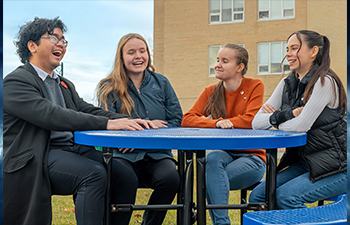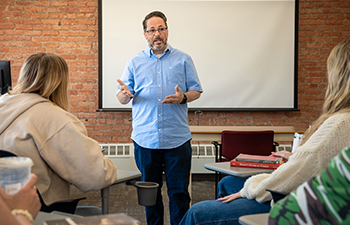Welcome
Welcome to St. Mary’s University Accessibility Services! We are committed to fostering an inclusive learning community that places equity and diversity at its heart and honours the inherent dignity of every student. Our Accessibility Services team offers tailored accommodations to remove barriers for eligible students, both Domestic and International, who face challenges fully engaging in academic and campus life. Whether you’re preparing for your first semester or finishing your degree, we are here to support every student and provide them with the support they need to thrive on campus and in the classroom!
At St. Mary’s University, academic accommodations are available to students who face barriers that affect their ability to participate fully in their studies. These barriers may be due to a medical condition or disability, or they may relate to non-medical reasons that are protected under human rights legislation.

Eligibility & Registration
Learn about accommodation eligibility, how to register for accommodation, and required documentation needed for academic accommodations.

Students Already Approved for Accommodations
Learn more about how to register for your accommodations for each term, how to book your accommodated tests, and disability grant funding

Info for Instructors
Since STMU instructors’ involvement is essential to our students’ academic journey, our office works closely with our shared students throughout the academic year.
Testing Centre
The Testing Centre at St. Mary’s University supports students who have approved exam accommodations. Our testing center has 11 seats, student cubbies, and video recording cameras.
Even if you don’t have an exam coming up, it’s worth checking out the Testing Centre early in the semester. Getting familiar with the space can help reduce stress later on. You’ll know what to expect, how to book your tests, and who to reach out to with questions.
Plus, if you’re not sure whether you qualify for accommodations or just want to learn more, our team is always happy to chat. We can walk you through the process, answer your questions, and help you feel more confident heading into the term.
Frequently Asked Questions
Accommodations do not automatically transfer to post-secondary. To receive academic accommodations at StMU, you must register with Accessibility Services and submit current documentation. While your IPP/ISP can help us understand your needs, it isn’t enough on its own to qualify for academic accommodations.
To begin receiving academic accommodations, students must:
reach out to the Student Accessibility Services (SAS) to indicate that you’re seeking accommodations, especially before your first semester or early in the spring/summer. We can help guide you on what to do next.
- Reach out to the Student Accessibility Services (SAS) by emailing access@stmu.ca to indicate that you’re seeking accommodations, especially before your first semester or early in the spring/summer.
- Submit documentation from a licensed healthcare provider outlining the disability/diagnoses and the need for accommodation. Documents must be up to date.
- Complete the Intake Process, including an in-person or virtual meeting to discuss needs and develop an accommodation plan with the Academic Access Coordinator.
Students must confirm their accommodations each term and request continued support.
All students requesting accommodations, whether for medical or non-medical protected grounds, must provide up-to-date documentation that explains and/or verifies the need for accommodations. This helps us understand your specific barriers and determine what supports are reasonable and appropriate. Accommodation decisions are made in line with StMU’s duty-to-accommodate practices and are based on:
- Verification of disability information
- Any additional supporting documents
- The essential competencies required in your program
- Individual, case-by-case considerations
Gathering appropriate documentation helps ensure a fair, consistent review for every student.
If you have questions or need help, email Accessibility Services at access@stmu.ca.
A high school Individual Program Plan (IPP) or Individualized Service Plan (ISP) by itself usually won’t meet documentation requirements. While your IPP/ISP can be helpful, we need current professional documentation that clearly outlines your diagnosis, functional limitations, and recommended supports. Acceptable documentation includes:
- A recent psychological or psycho-educational assessment by a qualified clinician
- A Verification of Disability form completed by a licensed medical professional
- A medical letter or specialist report detailing diagnosis, functional impact, and suggested accommodations
- For short-term conditions, a doctor’s note stating the nature and expected duration of the condition may be sufficient
If you’re unsure what to submit or don’t yet have up-to-date documentation, please contact Accessibility Services. We’ll guide and explain what kind of documentation is needed.
Accommodations are based on each student’s documented needs. Examples include:
- Notetaking supports or access to peer notes
- Alternative formats (e.g., accessible PDFs or e-textbooks)
- Audio recording
- Use of assistive technology (e.g., Genio, Speechify, Read & Write)
- Reduced course load with full-time status
- Distraction-reduced testing spaces
- Extended time on exams
- Use of spellcheck, grammar check, or speech-to-text tools
- Scribes or readers for exams
- Ergonomic or modified workstations
Students who are approved to use recording devices as part of their academic accommodations must have documentation recommending this tool to record any lecture. Before use, students are required to:
- Sign StMU’s Audio Recording Agreement Form (available from Accessibility Services).
- Notify instructors in advance that recording is an approved accommodation.
Recordings are for personal academic use only and must not be shared or redistributed. You must delete all recordings after the final exam period for the course ends.
A Memory Aid is a one-page cue sheet designed to help students with memory-related disabilities recall learned material during a test. It cannot contain answers or essential course content. Students who provide documentation showing impairments in memory or word retrieval through a formal psychoeducational or neuropsychological assessment.
To get your memory aid approved, you must submit an email of your Memory Aid to your instructor and accessibility services (access@stmu.ca) at least 3 business days before your test.
Your instructor can approve it, partially approve it by removing content, or reject it entirely if it compromises essential learning outcomes. Only during your test or exam. Any instructor changes are made beforehand.At St. Mary’s University, academic accommodations are available to students who face barriers that affect their ability to participate fully in their studies. These barriers may be due to a medical condition or disability, or they may relate to non-medical reasons that are protected under human rights legislation.
To qualify for academic accommodations, students must provide supporting documentation from a licensed healthcare or mental health professional. This may include medical letters, psychoeducational assessments, or functional limitation assessments.
Once documentation is received, the Academic Access Coordinator meets with the student to review their needs and discuss appropriate accommodations. Accommodations are determined collaboratively, ensuring they are reasonable, reduce barriers, and uphold the academic integrity and essential requirements of each course or program.
Remember: Accommodations must be reasonable, not perfect, and cannot compromise the academic standards or essential course requirements.
Students with accommodation (e.g., extra time, assistive tech, separate space) must book their test, quizzes, and any other evaluations through Testing Services at least 7 days in advance using the Exam Booking Form. Booking all tests well in advance is highly recommended to secure a place in the testing center. If you have the Speech-to-Text accommodation, you must let us know 7 days in advance to coordinate a space for you.
If your needs evolve, because of a new diagnosis, an exacerbation of symptoms, or just discovering that an approved support isn’t working, please:
- Email Accessibility Services (access@stmu.ca) or drop by the Student Success Centre (C114).
- Share any updated documentation from your healthcare provider.
- Meet with the Academic Access Coordinator to revise your accommodation plan.
- We’ll issue you a new Accommodation Letter and notify your instructors once you approve.
Yes! Through Alberta Student Aid you can access both federal and provincial grants:
- Canada Student Grant for Students with Disabilities – up to $2,800 per loan year for living and education costs; you’re automatically assessed if you indicate a permanent or prolonged disability (PD/PPD) on your application
- Canada Student Grant for Services and Equipment – up to $20,000 per loan year to cover assistive services or equipment; requires a completed Schedule 4 form, vendor quotes or cost breakdowns, and reconciliation of receipts
- Alberta Grant for Students with Disabilities – up to $3,000 per loan year for exceptional costs (e.g., specialized transportation, assistive technology); also requires Schedule 4 and receipts
To qualify:
- Apply for student aid at studentaid.alberta.ca and answer “yes” to having a permanent or prolonged disability (PD/PPD).
- Submit the Schedule 4 form with current professional documentation (e.g., psycho-educational assessment, Verification of Disability form, or specialist’s report). We can help you with this!
- Be enrolled full- or part-time in a designated post-secondary program.
- For services/equipment grants, include quotes when you apply and send in receipts by your study-period end.
If you need help completing Schedule 4, contact Accessibility Services, we can guide you through each step.
Click here for more information
If Alberta Student Aid has requested receipts (e.g., for disability-related equipment or services covered by a grant such as the Canada Student Grant for Students with Disabilities), you can upload receipts online via your Alberta Student Aid Account.
- Log in to your Alberta Student Aid account.
- Select Upload Documents.
- Upload clear scans or photos of your receipts (PDF format preferred).
- Submit and ensure you receive confirmation.
You can send the repayment through your bank by adding “Grant-Alberta Student Aid” as the payee and using your Alberta Student Number as the reference number.
You can always reach out to Alberta Student Aid directly at 1-855-606-2096 if you need further assistance.